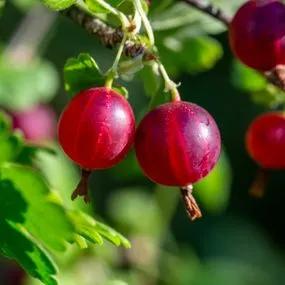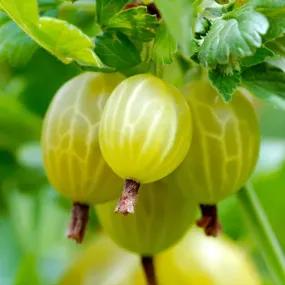This page is about fruit trees outdoors in your garden, or grown on wires against a wall, rather than a green house or polytunnel.
Just tell me the best fruit trees to grow in the UK, please
- Apple: Red Windsor in the West of Britain, Red Falstaff for the East, followed by Jupiter; we have a list of apples for cold Northern regions
- Cherry: Start with Stella, then Kordia, Sunburst, or Lapins for sweet cherries, Morello for sour
- Plum: Victoria for a sweet plum, Farleigh for a sour damson
- Pear: Conference, then Comice for another soft dessert pear, or the firmer Concorde is also good for cooking
- Gooseberry: OK it’s a tidy little shrub not a tree, but it performs so well in between fruit trees, taking up little space and giving you a crop before anything else: start with Invicta and Hinnonmaki Red
Which Fruit Trees Grow Best in the UK?
People planting a fruit tree or two in their garden, especially for the first time, want to know “which tree will grow well in my garden, cropping nicely with few care requirements, and no risk of disease?”
People usually have a favourite fruit tree, but if it won’t grow well in their location, that’s a deal breaker.
We’ve divided fruit trees grown in the UK into four groups.
Groups 1 & 2 are what the home grower should focus on first.
Once you have a collection of those, and decided that growing fruit is a long term hobby you, then progress to plants listed in groups 3 & 4:
- Apple Trees
- Other Reliable & Popular Fruit Trees
- Popular Trees That Require Ideal Conditions or Extra Care
- Reliable but Unpopular Fruit Trees
Apple Trees: Reliable, Popular, Diverse, Practical
Read our guide to choosing apple trees for details about the best varieties for your location.
Apple trees:
- Are popular
- Have diverse flavours & uses: eater, cooker, cider
- Come in varieties bred for good performance in almost every UK region
- Cover a very long season from early eaters in Summer to Winter Apples that store well into the New Year
For most people, the “minimum complete home orchard” contains one each of cherry, plum, and pear, but at least two apples: either an eater with a cooker, or an early season and a late season eater.
Reliable and Popular: Other Great Fruit Trees
- Pear: Conference, then Comice for another soft dessert pear, or the firmer Concorde is more flexible, also great for cooking
- Plum: Victoria for a sweet plum, Farleigh for a sour damson
- Cherry: Stella, Sunburst, or Lapins for sweet, Morello for sour; Morello is also the single best fruit tree for shade
Popular but Fussy: Fruit That Needs Ideal Conditions / Extra Work
- Peach, Apricot, Nectarine: Like lots of sun, shelter, and usually need protection from both frost and disease. Hybrids like Aprimira show better disease resistance than many old varieties, but are not immune to Peach Leaf Curl
- Fig* Trees: Require a sunny South facing site in warmer Western parts of the UK to fruit well. May fail to ripen in a cloudy Summer.
Brown Turkey is the best full size fig tree for the UK, but it needs some room. The dwarf Little Miss Figgy is a revolutionary patio variety that anyone with a sunny spot can grow conveniently in a pot. - Quince Trees: Like figs, quinces need a decent Summer to ripen perfectly
Reliable but Less Popular Fruit Trees: Not for Everyone!
- Medlar*: Once widely grown, most people haven’t heard of them today. Modest crops of tasty but small and inconvenient to ripen fruit
- Rowan*: Only useful for Rowan jelly. Wild rowans have variable fruit quality, the best variety for making jelly is Sorbus ‘Edulis’
- Hazelnut: We grow ‘Cosford’ hazels on a “short leg” trunk, that you lightly prune into a spreading tree. Can be disappointing on some rich garden soils, which are too fertile. Hazels need poor soil to crop well and not grow too leafy. Need squirrel protection
- Mulberry* Trees: Delicious, fragile, best eaten off the branch quickly before they end up on the ground or taken by birds. Fine for drying. Wild species trees are slow to bear fruit, grafted cultivars like King James crop earlier
- Persimmon / Sharon Fruit: Mature trees ripen reliably in the warmer Southern half of UK, unless Summer is exceptionally overcast. Needs storage and ripening & softening similar to a Medlar; some varieties like ‘Fuyu‘ are good to eat off the branch
- Cornus mas*: We sell the wild species Cornelian Cherry, which is edible but if you really want to harvest them go for a cultivar like ‘Jolico’.
* Trees marked with an asterisk are often grown ornamentally.
To begin choosing varieties that will grow well in your soil and local conditions, talk to your fruit-growing neighbours (especially down the allotment), read our fruit tree descriptions, and call us if you have any doubts.
- In Scotland and the North, trees that flower later are more likely to avoid late frosts.
- In partial shade, fruit that is intended for cooking has less sugar and so requires less sun to ripen.
- In full shade, nothing really fruits well: Morello sour cherries, Hazelnuts, and Elderberry are some of your only options for a modest crop.




 1.webp)
 1.webp)
 1.webp)
 1.webp)
 2.webp)
 1.webp)
 1.webp)
 1.webp)
 1.webp)
 1.webp)
 1.webp)
 1.webp)


 Img 1.webp)